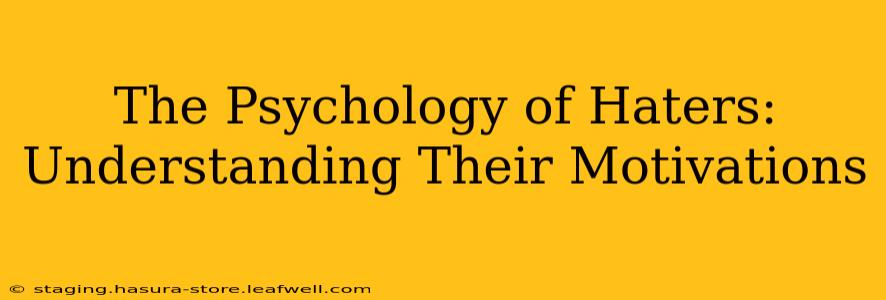We've all encountered them – the haters. Those individuals who seem driven by a relentless need to criticize, belittle, and spread negativity. But what motivates these behaviors? Understanding the psychology of haters is crucial, not only for navigating online interactions but also for fostering healthier relationships in all aspects of life. This exploration delves into the complex motivations behind hateful behavior, examining various psychological factors and offering insights into how to manage interactions with such individuals.
What Makes Someone a Hater?
The simple answer is there's no single "hater profile." Hateful behavior stems from a confluence of psychological, social, and personal factors. While some might be driven by conscious malice, others act out of deep-seated insecurities or unresolved emotional issues. Understanding the nuances is key to developing empathy – even if it's difficult to feel it directly.
Are Haters Insecure?
Yes, insecurity often plays a significant role. Many haters project their own inadequacies onto others. By putting someone else down, they temporarily elevate their own self-esteem, albeit in a destructive and unsustainable way. This behavior is a defense mechanism, a way to cope with feelings of inferiority or inadequacy. They might feel threatened by the perceived success or happiness of others, leading to the need to diminish those qualities.
What are the Psychological Factors Behind Hatred?
Several psychological factors contribute to hateful behavior:
- Low Self-Esteem: As mentioned above, individuals with low self-esteem may resort to negativity to compensate for their feelings of inadequacy.
- Projection: They project their own undesirable traits or feelings onto others. For example, someone who is envious might accuse others of being envious.
- Cognitive Biases: Confirmation bias, for example, leads individuals to selectively seek out and interpret information that confirms their pre-existing negative beliefs about a target.
- Narcissism: Narcissistic individuals often exhibit a sense of entitlement and a lack of empathy, leading to aggressive responses when their ego is challenged.
- Anger and Frustration: Unresolved anger and frustration can manifest as hateful behavior, aimed at a perceived source of their negative emotions.
Why Do People Hate on Social Media?
Social media exacerbates hateful behavior due to several factors:
- Anonymity: The relative anonymity of the internet empowers individuals to express themselves without fear of immediate consequences.
- Amplification: Online platforms amplify hateful messages, allowing them to reach a wider audience quickly and easily.
- Lack of Accountability: The ease of creating multiple accounts and the difficulty of tracing individuals online limits accountability for hateful actions.
- Group Polarization: Online echo chambers reinforce and amplify existing biases, leading to increasingly extreme viewpoints and behavior.
How Can I Deal With Haters?
Dealing with haters effectively requires a multi-pronged approach:
- Ignore and Block: Sometimes, the best strategy is simply to ignore and block hateful individuals. Don't engage; it only fuels their behavior.
- Set Boundaries: Clearly define your boundaries and communicate them assertively. Let the hater know their behavior is unacceptable.
- Seek Support: If you're struggling to cope with online hate, seek support from friends, family, or mental health professionals.
- Report Abusive Behavior: Utilize reporting mechanisms on social media platforms to flag abusive content and accounts.
Is There a Cure for Hatred?
There's no single "cure" for hatred. However, understanding the underlying psychological factors can lead to more compassionate and effective responses. Addressing personal insecurities, developing empathy, and fostering positive social connections are vital steps towards reducing hateful behaviors, both in ourselves and in others. Remember, hate is often a symptom of deeper issues, and understanding these issues is the first step toward fostering a more positive and accepting environment.

